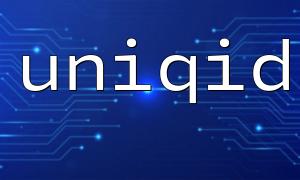In PHP development, generating a unique identifier is a very common requirement, especially in scenarios like user session management, order number generation, and file naming. PHP's built-in uniqid() function allows you to quickly generate a time-based unique ID, but the ID it produces is relatively simple, with limited security and complexity. To enhance the uniqueness and security of such identifiers, we can further process the result using the md5() function.
The uniqid() function generates a unique string based on the current microsecond timestamp. By default, it returns a 13-character string, for example:
echo uniqid(); // Output: something like 5f5a1d5b7e6a1
This ID is generally unique within the same process, but in high-concurrency scenarios, there is still a risk of duplication.
The md5() function hashes a given string using the MD5 algorithm, producing a 32-character hexadecimal string:
echo md5('hello'); // Output: 5d41402abc4b2a76b9719d911017c592
Using md5() increases the complexity and unpredictability of the string.
The idea is to first use uniqid() to create a time-based unique ID, and then hash that ID along with additional data using md5() to produce a more complex and secure identifier.
Example code:
<?php
// Generate base unique ID with more entropy (passing true as the second parameter adds more entropy)
$baseUniqId = uniqid('', true);
<p>// Add extra randomness to increase complexity<br>
$random = mt_rand();</p>
<p>// Concatenate the strings<br>
$rawString = $baseUniqId . $random;</p>
<p>// Encrypt with md5<br>
$uniqueId = md5($rawString);</p>
<p>echo $uniqueId; // Output: something like e4d909c290d0fb1ca068ffaddf22cbd0<br>
?><br>
The resulting $uniqueId has a fixed length of 32 characters, is highly unpredictable, and is practically guaranteed to be unique, making it suitable for most use cases.
If you require even more secure unique identifiers (e.g., in security-critical scenarios), consider using stronger hashing algorithms and more complex random entropy, such as hash() and random_bytes():
<?php
// Generate more complex random entropy
$randomBytes = bin2hex(random_bytes(16));
<p>// Concatenate uniqid with the random entropy<br>
$rawString = uniqid('', true) . $randomBytes;</p>
<p>// Hash using sha256<br>
$uniqueId = hash('sha256', $rawString);</p>
<p>echo $uniqueId; // Outputs a 64-character string, more secure<br>
?><br>
By combining uniqid() and md5() (or stronger hash functions), you can quickly generate complex, secure unique identifiers. It's a simple and efficient method suitable for the vast majority of PHP applications.


